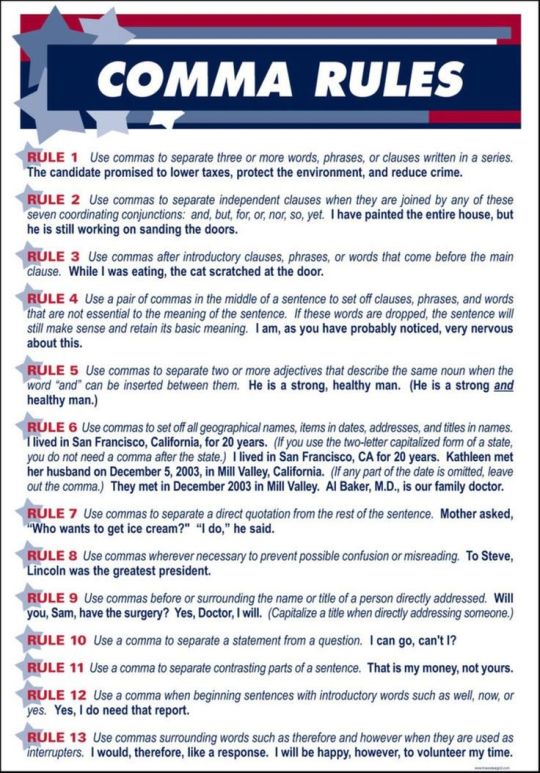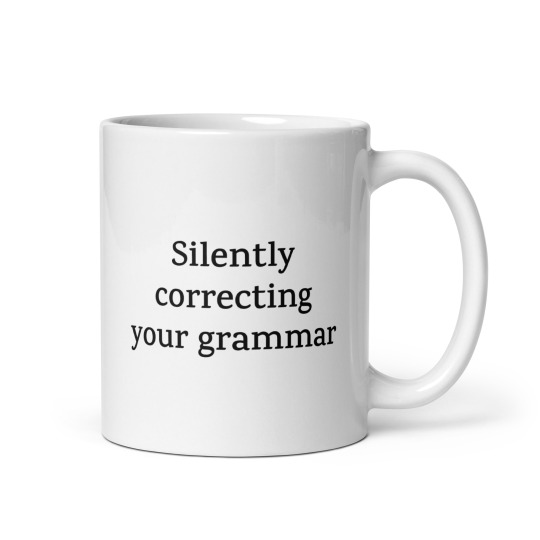#grammar rules
Explore tagged Tumblr posts
Text
my autobiography is just a list of third conditional statements
#grammar jokes#dad jokes#funny jokes#bad jokes#grammar police#grammar rules#grammar mistakes#grammar checker#language#grammar tips#vocabulary#english language#linguistics#idioms
2 notes
·
View notes
Text
My fellow writers, you should watch this video
youtube
3 notes
·
View notes
Text
Sometimes I romanticize my job by saying, “I write for a living.”
Yeah, I am a technical writer creating specialized documentation and answering support emails. But hey, at least it’s a good outlet for succinctity and bluntness. 😅
#I can construct a goddamn sentence#grammar rules#but English is a stupid language#technical writing#does this mean I write for a living?#I know succinctity isn’t a word I just wanted to use it as a noun
4 notes
·
View notes
Text

Everyone boo this fucking man. He wrote one book in 1795 and fucked us all over.
(Essay is “Says Who? Teaching and Questioning the Rules of Grammar” by Anne Curzan. It’s here for those who want it)
#Says Who? Teaching and Questioning the Rules of Grammar#Anne Curzan#grammar#grammar rules#Lindley Murray#English class#WR121#siobhan rants#the fucking audacity of this one fucking mad to just decide this
12 notes
·
View notes
Text

#writerscommunity#writer things#novel writing#writerslife#writing community#writers and readers#writers#writing#writers on tumblr#writing tips#grammar rules#comas
8 notes
·
View notes
Text
The Conditional Conundrum
What Ifs Imagine a world where every hypothetical scenario you envision can be vividly brought to life, where every “what if” transforms into a vibrant reality with just the flick of a grammatical switch. Welcome to the fascinating realm of the Spanish ‘condicional’ tense—a linguistic tool that unlocks the power to express possibilities, dreams, and polite requests with elegance and…

View On WordPress
#Conditional mood#Grammar guide#Grammar rules#Hypothetical scenarios#Hypothetical situations#Language education#Language Learning#Linguistic Exploration#Linguistic nuances#Polite requests#Spanish#Spanish conditional tense#Spanish grammar#Spanish language#Spanish Learning#Spanish verbs#Verb conjugation
1 note
·
View note
Text
The Organized Chaos of English Grammar: Why This Language Makes (Almost) No Sense—And Why That Is Beautiful
English is not merely a system of words—it is a curious, constantly evolving cultural artifact, a blend of rigid rules and chaotic exceptions that baffles even its most devoted admirers. For anyone who has attempted to learn it from the outside in, English can feel less like a language and more like an elaborate puzzle constructed over centuries by speakers who never quite agreed on the…
#adjective order#advertising#article usage#communication#cultural linguistics#Digital Marketing#do-support#English grammar#ESL#grammar education#grammar explained#grammar rules#grammar tips#hybrid language#jtwb768#language learning#linguistic quirks#marketing#phrasal verbs#Social Marketing#syntax oddities
0 notes
Text
I need people to explain different grammar rules like I'm 4. Because apparently we were taught in school the most I ever got was "comma is a short pause and a period is a breath." Mf I talk fast! I talk fast and with no breaks between sentences that does not help!
0 notes
Text
#wordsmarts.com#writing#writers on tumblr#writing prompt#writers#writer#my writing#daily writing prompt#daily writing#story#writing tool#grammar#grammar rules
0 notes
Text

https://abitbold.etsy.com/dk-en/listing/1836500926/funny-mug-silently-correcting-your
Funny Mug — Silently Correcting Your Grammar — Gift for Grammar Nerds, Teachers, Writers, Office Humor, Coffee or Tea Lovers
This mug is perfect for those who can’t help but notice every misplaced apostrophe or incorrect use of “their,” “there,” and “they’re.” Whether you're a grammar enthusiast, teacher, writer, or someone who just loves witty coffee cups, this mug speaks volumes about your passion for language without you having to say a word. It's ideal for your morning coffee, afternoon tea, or late-night cocoa as you analyze texts, edit documents, or just silently judge the grammar of the world around you.
A thoughtful gift for birthdays, holidays, or any special occasion, this mug is sure to bring a smile to the face of your favorite word nerd. The high-quality ceramic design ensures it will be a favorite companion for years to come, whether it's sitting proudly on an office desk or nestled at home in a cozy reading nook. This humorous and relatable mug is a must-have for anyone who takes pride in good grammar while sipping their favorite beverage.
Order yours today and let your mug do the talking—or correcting!
• Ceramic • 11 oz (325 ml) mug dimensions: 3.8″ (9.6 cm) in height, 3.2″ (8.2 cm) in diameter • 15 oz (443 ml) mug dimensions: 4.7″ (11.9 cm) in height, 3.3″ (8.5 cm) in diameter • 20 oz (568 ml) mug dimensions: 4.3″ (10.9 cm) in height, 3.7″ (9.3 cm) in diameter • Dishwasher and microwave safe • Design printed on both sides of the mug • Coffee, tea, or other beverage not included • Free worldwide shipping
#silently correcting your grammar#grammar nerd#grammar police#funny mug#grammar humor#word nerd#teacher gift#writer gift#editor life#proofreading#coffee and books#english major#book lover gift#grammar jokes#literary humor#wordplay#linguistics geek#funny coffee cup#office humor#grammar snob#grammar lovers#word lover#copy editor#bookish gifts#language nerd#english teacher life#writing life#bibliophile#mug for teachers#grammar rules
1 note
·
View note
Text
Has anyone seen "an one" used in a proper sentence?
The rule of a/an says that the latter is used before a word that starts with a vowel (apple, elephant, idea, only, uncle)
WAIT
NOW THAT I THINK ABOUT IT, THERE ARE SO MANY VOWEL WORDS THAT DON'T AN
Unanimous (a unanimous decision), union (starting a union) FUCKING "ONE" (A ONE TIME OPPORTUNITY)
WHAT ARE THE RULES
#english#american english#grammar#grammar rules#GOD FUCKING HELP ME#shower thoughts#but im in my bed
0 notes
Text
A question for writers/betas/editors of tumblr, what is your preferred style of writing dialogue?
[All evidence I can find is that both are valid and it’s just a style choice, if you start debating the legitimacy or illegitimacy of either then I’ll get a migraine.] [Also language is fluid calm tf down about all language pet peeves.]
I am team lowercase, for the record.
0 notes
Text
A Questionable Guide to to the English Language, Part 2
A noun is a word (other than a pronoun) that identifies a person, place, thing, or idea. A noun (or a noun phrase) is always the subject of the sentence, which is attached to the sentence’s predicate.
A common noun is a noun that identifies a class or type of person, place, thing, or idea, such as firefighter, house, car, or freedom. Often, it refers to the thing in general rather than one in particular. An exception to this is when the noun is preceded by a definite determiner, such as the, this, that, or those; in this case, which one the noun refers to is dependent on context.
A proper noun is a noun that identifies an individual person, place, or organization, such as Mary, London, or Nintendo. Unlike common nouns, proper nouns cannot take definite determiners. In English, proper nouns are written with the first letter capitalized.
A pronoun is a noun with a positive charge. As mentioned earlier, it is does not identify a person, place, or thing, as a result of its charge. Compare with neunoun, which has no charge, and elecnoun, which has a negative charge.
#english#language#language guide#questionable#dubiously useful#noun#common noun#proper noun#pronoun#grammar#grammar rules#language lessons#cb defining stuff
0 notes
Text
Let's put a full stop to that
I read a lot of ARCs, or, to be more accurate, a lot of galleys. As writers, we should strive for accuracy, so with that in mind, I thought I'd put together a little guide, looking over some of the errors I see again and again in galleys.
I read a lot of ARCs, or, to be more accurate, a lot of galleys. Galleys are the same as ARCs [Advanced Reader Copies], they’re just digital. When you read ARCs, galleys, or proofs, you have to be willing to overlook the errors, or missing assets (illustrations, maps, logos etc.), throughout. It is a work in progress, not a completed, polished product. As writers, we should strive for accuracy,…
View On WordPress
#English#English grammar#English Language#English lesson#English Lit#English Literature#English Studies#Grammar#Grammar rules#Writer#Writing#Writing advice#Writing in English#Writing rules
0 notes
Text
You know when you start a fic with a good premise and fun plot but realize quickly that the writer of this fic is just a little, baby writer? A brand new baby writer who is just starting out, and you're so proud of them and want to pat them on the back and tell them how awesome they are.
There's a long journey ahead, and you may look back at the stuff you write today and hate it, but quality is subjetive. Please never think that the stuff you create as a beginner lacks worth. If you never write the bad stuff, you'll never be able to write the exceptional.
So this new baby writer is doing the work and you couldn't be more excited and proud of them.
But also you cannot wait until someone explains that you need to separate different speakers' dialogue into different paragraphs. Please, for the love of all that is good and sacred, separate your different characters dialogue so I can follow what the crap is going on. I love you. You're amazing. Please separate the dialogue.
#writing#new writers#old writers#writing practice#fic#writing fic#reading fic#grammar rules#learning to write#I love you new baby writers#You have no idea how important you are#I will fight the gatekeepers who try to discourage you.#You're doing amazing#but also your life will become so much easier once someone you trust explains a few of the rules#this is NOT AND EXCUSE for someone to go off and give unsolicited feedback by the way#writing critique is something that needs to come from someone you trust who can help you grow and get better without discouraging you#Helping new writers is an art in and of itself.#If I'dve known how far I had to go when I first started I'd have given up#Do not be the reason someone else gives up
0 notes
Text
Which is correct to say: "Do you understand" or "Did you understand"?
The choice between "Do you understand?" and "Did you understand?" depends on the context and the timeframe being referred to.
"Do you understand?" is in the present tense and is commonly used when asking someone if they currently understand something. It implies that you are asking about their current comprehension or asking for clarification on something that was just said or explained. For example:
"I just explained the concept. Do you understand?" "Do you understand the instructions for the game?" "Did you understand?" is in the past tense and is typically used when referring to a specific moment or event in the past. It asks about someone's understanding of something that was discussed or explained earlier. For example:
"During the meeting, did you understand what the speaker was saying?" "When you read the book, did you understand the ending?" So, if you are referring to the present moment and asking about someone's current understanding, you would use "Do you understand?" If you are referring to a past event or asking about someone's understanding of something that occurred earlier, you would use "Did you understand?"
1 note
·
View note